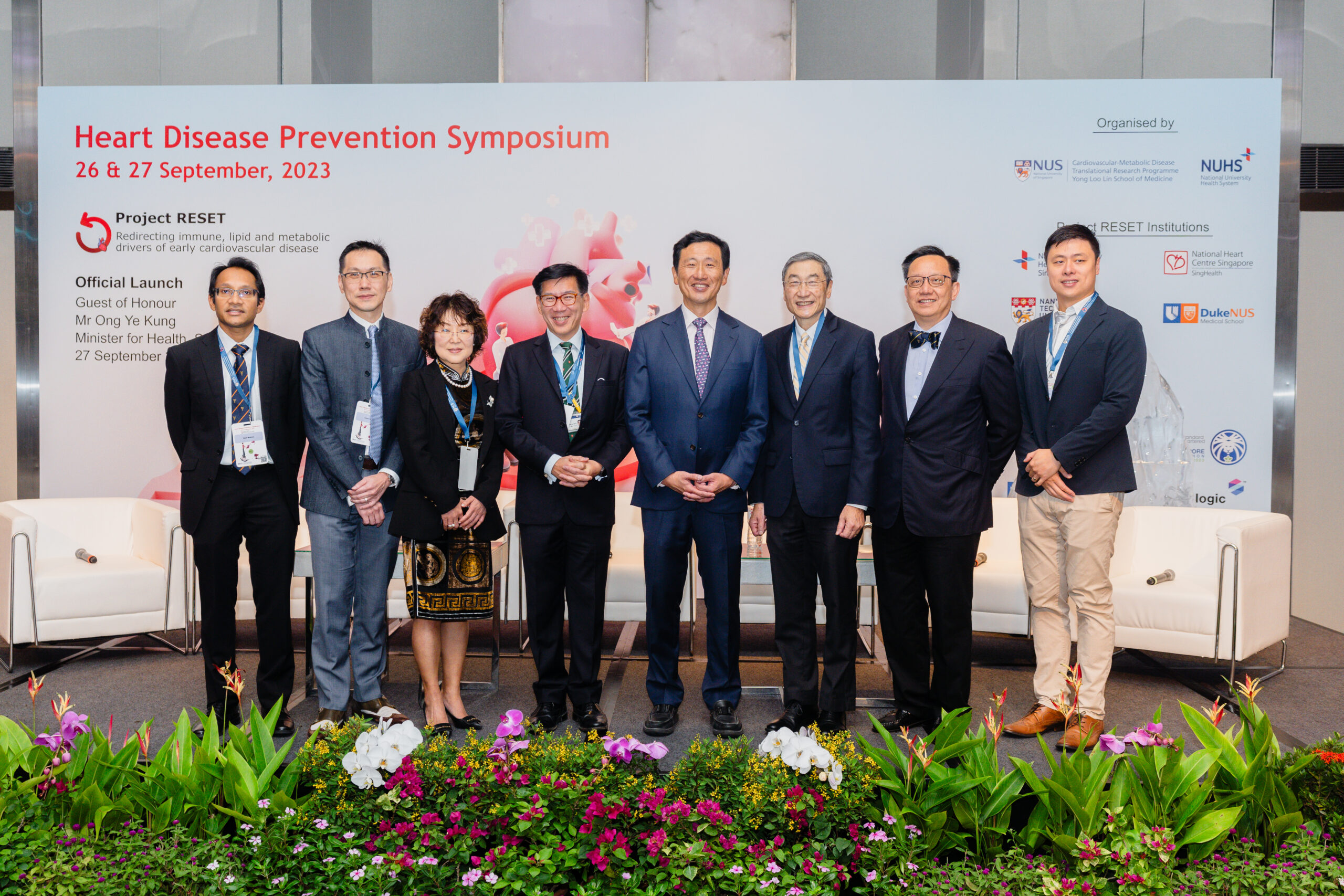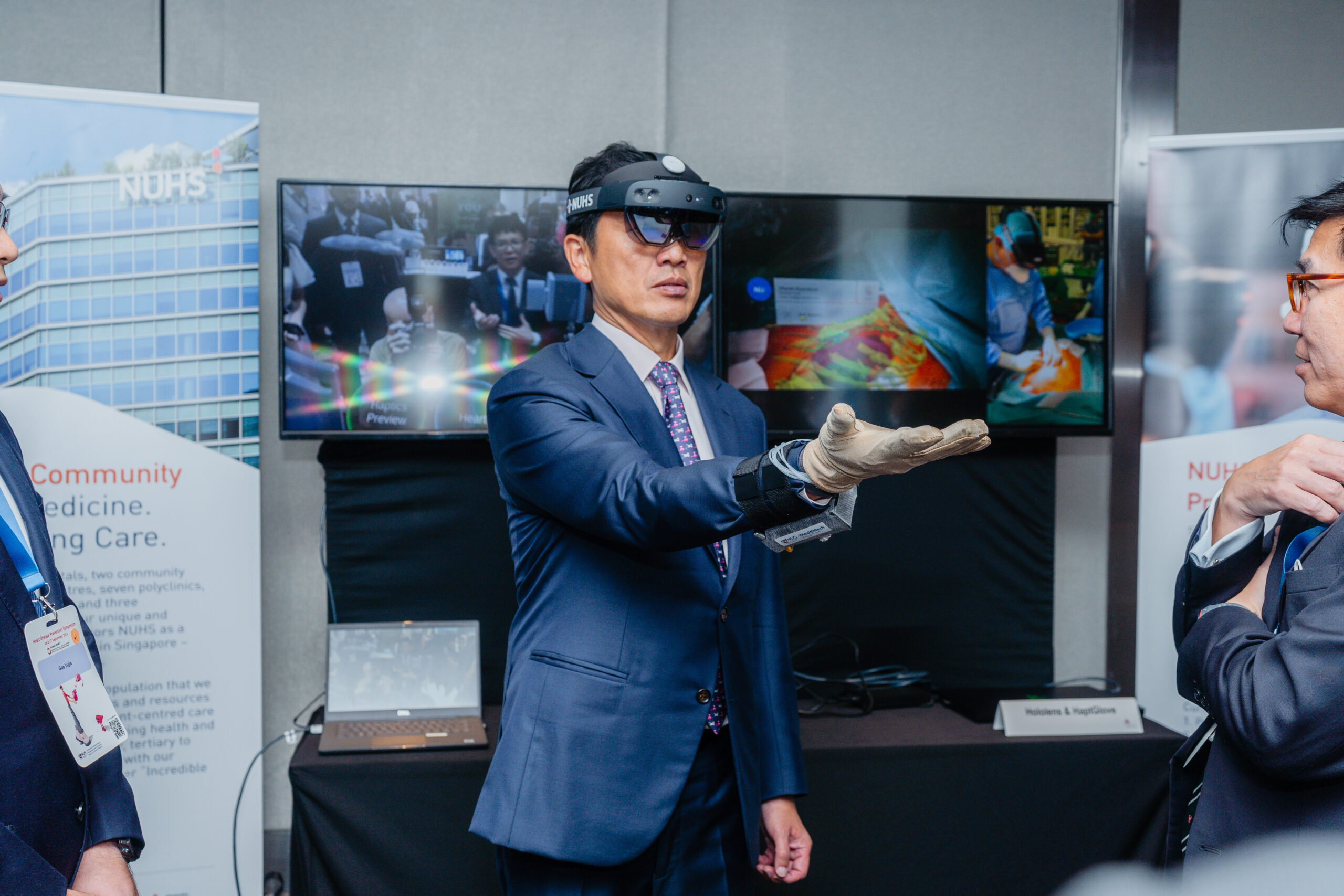Launch of Project RESET: Nationwide preventive heart health translational research programme
Published: 29 Sep 2023

Project RESET, a nationwide preventive heart health study spearheaded by NUS Medicine was launched on 27 September 2023. The event was graced by the Guest-of-Honour, Minister for Health, Mr Ong Ye Kung (fourth from right).
To study and implement the best ways to tackle heart disease in Singapore, the Yong Loo Lin School of Medicine, National University of Singapore (NUS Medicine) together with the National University Health System (NUHS), National University Heart Centre, Singapore (NUHCS), National Heart Centre Singapore (NHCS), National Heart Research Institute Singapore (NHRIS), Duke-NUS Medical School, Nanyang Technological University, Singapore (NTU Singapore), A*STAR’s Bioinformatics Institute (BII), Genome Institute of Singapore (GIS), Singapore Institute for Clinical Sciences (SICS), industry and community partners will be embarking on an ambitious, large-scale study to gather evidence to map the extent of the disease, identify new biomarkers, as well as develop innovative preventive measures that Singaporeans can adopt.
Project RESET, launched on 27 September 2023 at the Heart Disease Prevention Symposium 2023 by Mr Ong Ye Kung, Minister for Health, is supported by a newly awarded S$25 million grant from the National Research Foundation, Singapore and the Singapore Ministry of Health’s National Medical Research Council.
Heart disease is a complex condition influenced by a range of factors that are not exclusively age-related. These include sedentary lifestyles, unhealthy diets, genetic predisposition and socioeconomic conditions. In Singapore, 23 people die every day from cardiovascular disease. More than one out of three deaths in Singapore are due to heart diseases or stroke.
According to a recent paper published by researchers from the Cardiovascular-Metabolic Disease Translational Research Programme (CVMD TRP) at NUS Medicine and the Department of Cardiology at NUHCS under NUHS in the Lancet Regional Health Western Pacific, the number of heart attacks in Singapore is projected to rise nearly three-fold (194.4%) from 482 cases per 100,000 population in 2025 to 1,418 per 100,000 population in 2050. In 2025, it is predicted that four in 1,000 Singaporeans will have a heart attack.

Mr Ong Ye Kung, Minister for Health, using the help of the Microsoft HoloLens technology and virtual reality glove to hold and feel the difference between healthy and unhealthy heart muscles. The tougher the organ is, the more prone it will be to future diseases.
Professor Roger Foo, Corresponding Principal Investigator of Project RESET, and Director of the Cardiovascular-Metabolic Disease Translational Research Programme (CVMD TRP) at NUS Medicine and the Cardiovascular Research Institute under NUHCS, said, “The different factors that contribute to heart disease will be investigated by capturing a variety of data points – from lifestyle information down to genetic variations – to provide a full diagnostic picture for each patient. This has never been achieved at this scale elsewhere before. Project RESET will also leverage artificial intelligence to develop effective preventive strategies and make preventive heart health more accessible and relevant to individuals.” Professor Foo is also Senior Consultant, Department of Cardiology, NUHCS.
More than 10,000 Singaporeans will be invited to participate in the project, and have their heart, liver and metabolism assessed. Of these participants, 3,000 will be selected for a five-year follow-up programme where new technologies will be deployed and piloted.
Project RESET is also one of the initiatives that will be piloted at Health District @ Queenstown where the study team will work closely with policymakers, urban planners and community leaders to create spaces that support the community’s physical, social and mental well-being, and reduce environmental factors that contribute to heart disease.
“Much of our understanding of health and disease comes from non-Asian sources. We are trying to change that at NUS Medicine. By delving deeper and getting a better understanding of how biology, natural history, lifestyles, genetic susceptibility affect therapeutic responses to diseases in Singapore, such as cardiovascular-metabolic diseases, we can potentially reverse disease trajectories not just in Singapore but Asia. I am confident that Project RESET will be a game-changer in advancing Asian heart health,” said Professor Chong Yap Seng, Dean, NUS Medicine, and Deputy Chief Executive (Education & Research) of NUHS.
Read more in the press release here.


